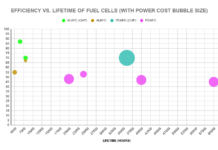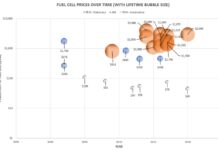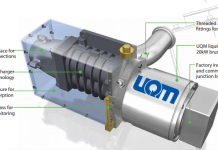Tyler Hamilton
![]() There was a shareholder who stood up at Ballard Power’s annual meeting last week to share her experience with the company’s stock price. It pretty much summed up the frustration shared by most investors in the fuel-cell industry.
There was a shareholder who stood up at Ballard Power’s annual meeting last week to share her experience with the company’s stock price. It pretty much summed up the frustration shared by most investors in the fuel-cell industry.
This investor has owned Ballard (BLDP) shares for most of 20 years. She sold in early 2000 when the stock hit $140 a share and did quite well. That was when the hype around fuel-cell powered cars was approaching its fever pitch.
Later that year she bought back into the company at about $120 a share, believing the stock was poised for another run. Bad move. The drop continued, to the point where today shares are struggling to stay above $1.
What’s a CEO to say? Ballard chief John Sheridan, who holds 500,000 or so shares himself, said he understood and felt the pain. But he emphasized, as he has in the past, that the market continues to undervalue fuel-cell companies generally and Ballard specifically.
There’s no question the industry has had a history of over-promising and under-delivering, and it continues to pay dearly for miscalculations. German automaker Daimler AG predicted a decade ago that 100,000 fuel-cell car engines would be produced annually by 2005.
Even less ambitious targetsbut no less unrealistichave been missed. Ballard told Time magazine in 1999 that fuel-cell vehicles would be economical by 2010. PricewaterhouseCoopers predicted in 2001 that sales of the vehicles would reach one million a year by 2010.
Of course, we know how that turned out. Around mid-2000 the government and auto industry began shifting attention to battery-powered vehicles. The media lost interest, tired of reporting on yet another pilot project or hydrogen-powered bus sale.
Big investors, more importantly, lost their appetite for the technology. Too much had been spent, and it was taking far too long for the promised hydrogen economy to emerge. Time to move on.
Technology analyst Brian Piccioni, most recently of BMO Capital Markets, said governments are in no mood these days to spend, let alone engage in another wave of support for fuel cell projects. And raising capital from the private sector remains a huge challenge.
Despite this tough environment, there was a true sense at Ballard’s annual meeting that the industry is nearing a tipping point.
No, I’m not suggesting that fuel-cell cars will soon be in a showroom near you. That’s still a long-term dream given existing infrastructure challenges. But fuel cells are seriously beginning to gain traction in certain sectors and for specific applications.
Volumes are building to impressive levels, costs are coming down, and some companies – Ballard among them – are flirting with profitability.
Since 2009 Ballard’s average product cost has fallen by 60 per cent. Revenue is expected to surpass $100 million in fiscal 2012, more than double 2009 results. As a result, the company is projecting it will have positive cash flow in the second half of 2012.
It also expects to hit the breakeven mark for “adjusted” earnings before interest, taxes, depreciation and amortization, which is a sneaky way of measuring operating performance that excludes certain items. It does, however, hint at true profitability within reach.
“It’s a true milestone in our history and our industry as well,” Tony Guglielmin, chief financial officer of Ballard, told shareholders.
In fact, there’s a bit of a race to profitability going on in the industry, with companies such as FuelCell Energy (FCEL) and ClearEdge demonstrating that they’re closing in on that goal.
More telecommunications firms are seeing the benefits of fuel cells for providing clean back-up power. More municipalities are adding fuel cell-powered buses to their fleets, and more warehouses are ditching lead-acid batteries in favour of fuel-cell forklifts. It’s not a tsunami, mind you, but it’s also not a trickle anymore.
This isn’t just because it’s the “greener” option. Products are gaining traction because, in certain applications and geographies, they are cost-competitive and simply better.
Another growth area is the use of fuel cells for distributed power generation, either to more efficiently use natural gas or biogas to produce electricity, or to use surplus or off-peak renewable energy to make and store the hydrogen that powers fuel cells.
As more renewable energy sources are added to the power mix of grids, there will increasingly be a need to store and later retrieve that energy on a large scale. Grid stability will come to depend on it.
For that use, the hydrogen and fuel cell combo might have been too expensive five years ago, but today it fits the bill in many jurisdictions and for many companies. The outlook will only get better.
So is Ballard under-valued? Judging by the direction of its costs, sales and industry trends, there’s a good argument that it is.
We may not see the hydrogen economy that gave shareholders $140 a share 12 years ago, but the fuel-cell market is poised for growth and Ballard – after a long and painful transition – is finally in a good place.
Tyler Hamilton is editor-in-chief of Corporate Knights magazine a business columnist for the Toronto Star, and author of Mad Like Tesla. In addition to the Clean Break blog, where this article first appeared, Tyler writes a weekly column of the same name that discusses trends, happenings and innovators in the clean technology and green energy market.









Tyler,
I was wondering what your thoughts were now that Ballard has adjusted its revenue projection for the year. I was also wondering what your thoughts were on why Ballard has not developed the Canadian fuel cell bus market more. Whisler is the largest fleet in the world, but outside of that, it seems like no other city in Canada is running a test fleet of fuel cell buses. It seems odd to me that S.A., Europe, and even the USA are running test fleets of fuel cells, and Canada isn’t doing anything outside of the Whisler fleet.